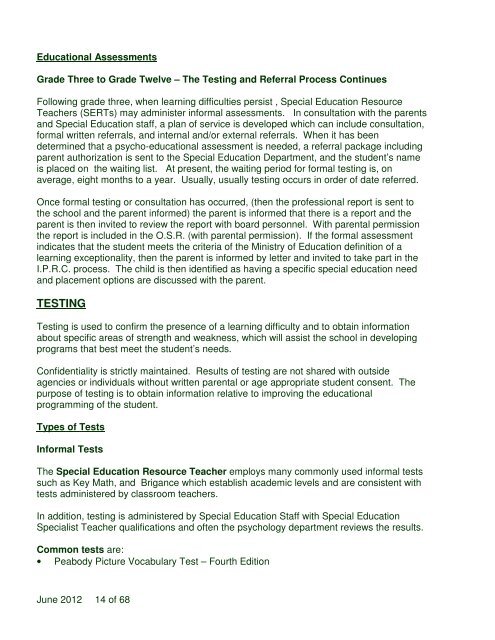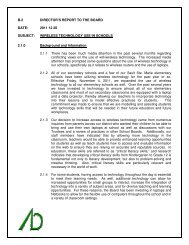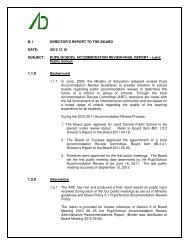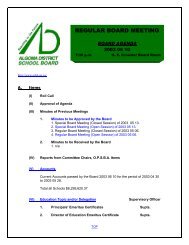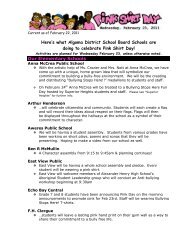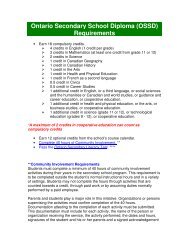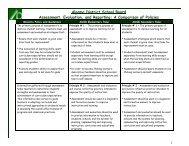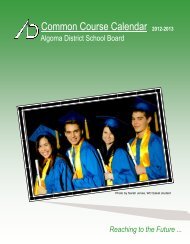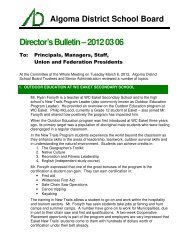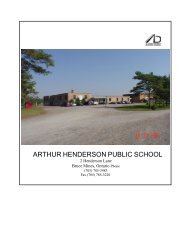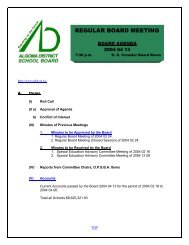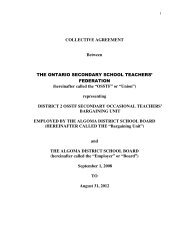Special Education Plan 2012-2013 - Algoma District School Board
Special Education Plan 2012-2013 - Algoma District School Board
Special Education Plan 2012-2013 - Algoma District School Board
- No tags were found...
Create successful ePaper yourself
Turn your PDF publications into a flip-book with our unique Google optimized e-Paper software.
<strong>Education</strong>al AssessmentsGrade Three to Grade Twelve – The Testing and Referral Process ContinuesFollowing grade three, when learning difficulties persist , <strong>Special</strong> <strong>Education</strong> ResourceTeachers (SERTs) may administer informal assessments. In consultation with the parentsand <strong>Special</strong> <strong>Education</strong> staff, a plan of service is developed which can include consultation,formal written referrals, and internal and/or external referrals. When it has beendetermined that a psycho-educational assessment is needed, a referral package includingparent authorization is sent to the <strong>Special</strong> <strong>Education</strong> Department, and the student’s nameis placed on the waiting list. At present, the waiting period for formal testing is, onaverage, eight months to a year. Usually, usually testing occurs in order of date referred.Once formal testing or consultation has occurred, (then the professional report is sent tothe school and the parent informed) the parent is informed that there is a report and theparent is then invited to review the report with board personnel. With parental permissionthe report is included in the O.S.R. (with parental permission). If the formal assessmentindicates that the student meets the criteria of the Ministry of <strong>Education</strong> definition of alearning exceptionality, then the parent is informed by letter and invited to take part in theI.P.R.C. process. The child is then identified as having a specific special education needand placement options are discussed with the parent.TESTINGTesting is used to confirm the presence of a learning difficulty and to obtain informationabout specific areas of strength and weakness, which will assist the school in developingprograms that best meet the student’s needs.Confidentiality is strictly maintained. Results of testing are not shared with outsideagencies or individuals without written parental or age appropriate student consent. Thepurpose of testing is to obtain information relative to improving the educationalprogramming of the student.Types of TestsInformal TestsThe <strong>Special</strong> <strong>Education</strong> Resource Teacher employs many commonly used informal testssuch as Key Math, and Brigance which establish academic levels and are consistent withtests administered by classroom teachers.In addition, testing is administered by <strong>Special</strong> <strong>Education</strong> Staff with <strong>Special</strong> <strong>Education</strong><strong>Special</strong>ist Teacher qualifications and often the psychology department reviews the results.Common tests are:• Peabody Picture Vocabulary Test – Fourth EditionJune <strong>2012</strong> 14 of 68


